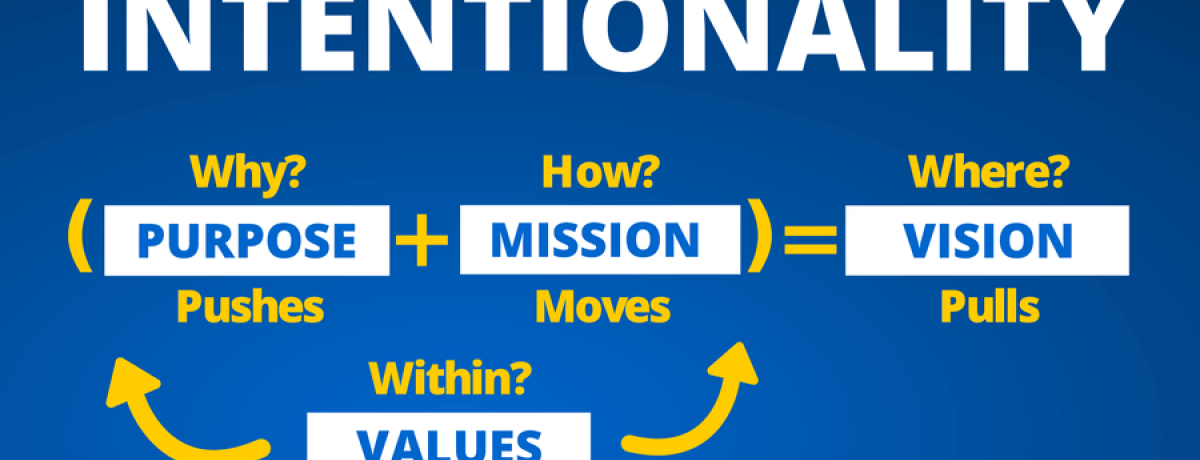
How To Setup Your Business For Success
Many go into business with the intent to succeed, but few endure long enough to arrive at sustainable flourishing. In a previous blog post and the Path Of The Freelancer book, I dive into the Formula for Intentionality as the foundation for building a business that lasts. As you see in the graphic above, this foundation is firmly rooted in knowing our purpose, vision, mission and core values. In this post, we'll explore these concepts.
Let's Get At It!

Life is Hard. Business is Challenging. The World is Uncertain.
Leaders, freelancers, and entrepreneurs: Get stories & systems, for navigating the challenges, in your inbox.
Our first step in business success is knowing where we are coming from and what is driving our desire to succeed. Understanding Our Motivation starts with our purpose statement. What propels us forward, is our purpose. This is why we have started or will start, our business. This is why we get up out of bed every day to work. Regardless of achieving success, knowing we have lived out our purpose in the journey is important because we will fail along the way.
How Leaders Inspire Action (TED Talk by Simon Sinek)
The following video is a powerful TED Talk by Simon Sinek which helps us to understand our purpose and business. He directs us to start with why, what we believe, our purpose. This purpose will not only help us achieve success, it will inspire others to follow in a way few other things will. Watch the video, below.
Defining Success: Our Vision Statement
Our next step in being successful in our business is to define our success. We can't know how to get where we are going until we determine where that destination is located! Many business owners will call this our vision statement, and this vision statement is the "where" we are going.
Vision can be tricky. For those of us who see potential everywhere, it's challenging to focus long enough to pick an area and go after it. As a business, we can spread our focus across many different points, but we need to narrow our focus so we have the ability to sustain and progress towards a long-term effort towards our vision.
What Is Success? (TED Talk by Jessica Hamilton)
The following video is a TED talk by Jessica Hamilton. In this video, Jessica helps us to think about what success means to us.
How Will We Get To Our Destination? With A Mission!
With purpose, we now know what is driving us forward, and with vision, we now know what is pulling us forward. The next step is to identify how to traverse the path between the two.
There are many ways to live out our purpose and there are many ways to arrive at our vision, which way we choose to go is our mission. Our mission is the how. When we concisely define how will we get from point a to point b, this becomes our mission statement. Now, take some time, think about how you're going to help other companies succeed. Write down your mission.
Once we have a mission statement in place, we'll want to explore three mission-critical items.
Mission Critical Items
Assuming we have an idea with value, and we have a market willing to purchase it, there are several necessary understandings to succeed in the long term. Once we grasp these concepts, we will increase our chances of long-term success. Let's start with the first.
Our first mission-critical objective is being continuum oriented instead of event-driven.
Think of hunting and farming as the difference between event-driven and continuum oriented. When we hunt, we usually kill more than we need and it can sustain us for a while. Unfortunately, when we operate this way we are always relying on the big kill. The bigger our tribe becomes, the more we have to hunt and kill. If we are unable to find an animal, we starve.
In a farming approach to business, we are planting seeds for future growth and this allows us to store up and house for future use. When we have enough food to sustain us, hunting becomes a bonus, not a burden.
In business, this means we need to create systems which will feed us in the immediate and long-term. While we hunt, let's improve how we hunt so we can become more effective. When we farm, let's learn how to become better farmers. When we write down what we learn in our journey, this allows us to teach others who join our team. It also creates less reliance on team members and more on powerful systems. This has the added benefit of relieving the burden of team members to be more successful.
Our second mission-critical objective is establishing checkpoints for our journey.
When we have a clear vision, we should know when we are making progress towards or away from it. When we see where we are and where we want to be, we can now write down checkpoints for ourselves to ensure our efforts are moving in the right direction. If we hit a checkpoint, we know we are progressing. If a checkpoint keeps getting further away or we pass it below our expectations we now re-evaluate our actions. This re-evaluation allows us to course correct or reset our expectations to be more realistic. Without checkpoints, we can find ourselves trekking a long distance before we realize we are lost or we don't take the time to celebrate the success we've had.
Our third mission critical item is knowing when to end our efforts.
There are two sides to this statement. The first is knowing when to end it when we fail, and the second is knowing when to end it when we succeed.
On the potential of failure, we need to identify how much time, money, efforts, and resources we are willing to put in before we call it quits. Starting and running a business is an emotional endeavor and if we fail to set an endpoint before we start, it will be difficult to cut ties when we need to. Being in a situation where it needs to end and we keep going is potentially the most dangerous place for a business owner to put her/himself and team into.
On the flipside, we also need to identify when we exit on a positive note. When do we sell, give or shut down our business? If we don't clearly define this, we can end up becoming complacent and comfortable after arriving at our destination. This leads to a slow and steady drop in excellence and accountability.
Conclusion
Purpose (the why), Vision (the where) and Mission (the how) are critical components of building a successful business. When we have these, and we operate in the continuum, have checkpoints and an endgame in mind, we increase our chances of success substantially.
Which of these ingredients are you missing in your business?


